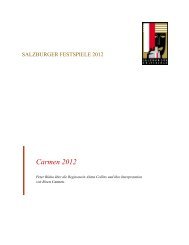Programmfolder Pfingstfestspiele 2013 - Salzburger Festspiele
Programmfolder Pfingstfestspiele 2013 - Salzburger Festspiele
Programmfolder Pfingstfestspiele 2013 - Salzburger Festspiele
Sie wollen auch ein ePaper? Erhöhen Sie die Reichweite Ihrer Titel.
YUMPU macht aus Druck-PDFs automatisch weboptimierte ePaper, die Google liebt.
understanding, that she too loves the Roman; horrified, Adalgisa flees back into her<br />
temple. However, Norma’s love turns to hatred and revenge when she experiences how<br />
Pollione brutally rejects her and tries to win back Adalgisa by force. Like the Greek Medea,<br />
Norma wants to kill her children because being betrayed by the man she loved has killed<br />
everything in her that was once her life. But then mother love conquers the bitterly disappointed<br />
love of her husband. She is unable to kill her children. She summons her rival<br />
and asks her to take the children and flee to Rome. Adalgisa, however, intends to go to<br />
Pollione with the sole intention of persuading him to return to Norma and to his children.<br />
The two women become friends and try to solve the conflict together. But how?<br />
The war is to continue under Norma’s leadership. Consul Pollione is to be replaced in<br />
office by an even crueller successor – it does not appear wise to set forth at this point.<br />
And then Norma also finds out that Pollione has declined to accept Adalgisa’s suggestion<br />
of finally returning to her and to his children. There she really does curse all the<br />
Romans but means only the one who is her enemy not as a Roman but as the traitor of<br />
her love. The signs of sacrifice are favourable for the Celts but it turns out differently:<br />
Pollione, when attempting to abduct Adalgisa by force from the temple, is captured and<br />
Norma herself is to pronounce the verdict, the sentence of death as demanded by the<br />
Druids. But she does not do this. Beforehand, as she says, she wants to speak to him<br />
privately once again and in so doing offers him the chance to save his life, by leaving<br />
Gaul and Adalgisa forever. He rejects this. And then comes the complete sur prise:<br />
Norma declares to the Celtic priests that she will offer herself as the sacrifice that appears<br />
necessary so as to bring victory; she herself, she reveals, has betrayed her god and also<br />
her people by loving that Roman.<br />
6 Entry into the unconditional or: the reversal of sacrifice<br />
By taking this step Norma apparently joins together with the spirit of ritual magic and<br />
chauvinism: war, sacrifice, victory, guilt, atonement – endless loss of blood again as<br />
a service to God; in fact it almost looks as if Norma’s end were only an act of such a<br />
sacrifice from despair, destructive revenge on herself for Pollione’s betrayed love, in<br />
which she believed and without which her life now appears to have been ravaged.<br />
Nevertheless, in reality something completely different happens: Norma returns once<br />
more to Pollione and confesses to him that she still loves him, until death, forever. At<br />
this moment it is no longer the question of being loved oneself, here Norma’s love is<br />
absolute, as the only value, as her truth, as what it is from the bottom of her heart. She<br />
entrusts her children to the father, from whom she asks forgiveness. Then priestesses<br />
cover her in the shroud of death and she mounts the stake. But now also the Roman<br />
Pollione: when he realises who Norma really is, he finds his love (and in it also himself)<br />
again; he dies together with her.<br />
Does this double sacrifice prove the Celtic gods to be right? Certainly not! It is rather a<br />
victory of love over one’s own injured pride, over the tendency towards revenge, over<br />
the inability to reconcile social traditions; a process of maturity from the priestess to the<br />
woman, to the mother and to a pure and truly loving woman. It is a continuous discarding<br />
of layers: ultimately Norma does not sacrifice herself as one of the guilty ones of<br />
the Irmin gods, finally she goes to her death in loyalty to herself, to her love, to the<br />
presentiment of happiness that should last forever and for that reason alone in the<br />
constricted world of finite interests and institutions has no chance of becoming reality.<br />
Yet what is reality if our heart is seized in itself by a truth that destroys everything exterior?<br />
When Heracles, as the Greeks used to relate, died in the Nessus dress because of fearful<br />
mistrust of his wife Deianira, he did indeed burn before the eyes of people, but in reality<br />
he rose up to Heaven and in dark nights he shines up there as a star in the evening sky<br />
every summer. By dying, Norma does not sacrifice herself and is also not sacrificed. What<br />
is referred to as such unleashes in her and then also in Pollione only a happiness that lives<br />
infinitely far away from lowliness because it is born in the womb of a love which is truly<br />
divine.<br />
Translated by Elizabeth Mortimer<br />
Eugen Drewermann, PhD Theology, born in 1940. Since withdrawal of the permission to teach<br />
and having been suspended from office as a priest, he has worked as a therapist and author. He<br />
has written over 80 books, including several volumes on meditation and preaching.<br />
13

















